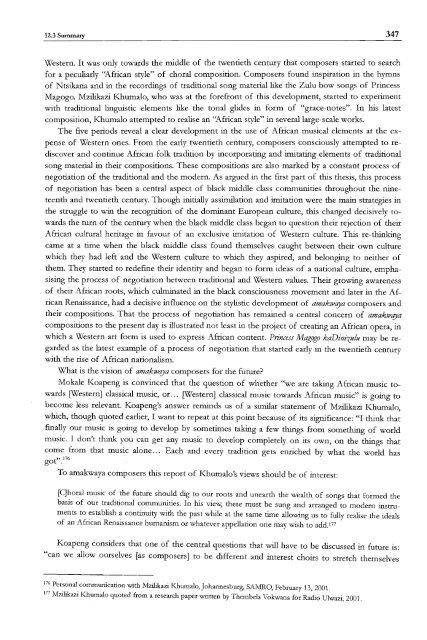South African Choral Music (Amakwaya): Song, Contest and the ...
South African Choral Music (Amakwaya): Song, Contest and the ...
South African Choral Music (Amakwaya): Song, Contest and the ...
Create successful ePaper yourself
Turn your PDF publications into a flip-book with our unique Google optimized e-Paper software.
12.3 Summary 347<br />
Western. It was only towards <strong>the</strong> middle of <strong>the</strong> twentieth century that composers started to search<br />
for a peculiarly "<strong>African</strong> style" of choral composition. Composers found inspiration in <strong>the</strong> hymns<br />
of Ntsikana <strong>and</strong> in <strong>the</strong> recordings of traditional song material like <strong>the</strong> Zulu bow songs of Princess<br />
Magogo. Mzilikazi Khumalo, who was at <strong>the</strong> forefront of this development, started to experiment<br />
with traditional linguistic elements like <strong>the</strong> tonal glides in form of "grace-notes". In his latest<br />
composition, Khumalo attempted to realise an ''<strong>African</strong> style" in several large-scale works.<br />
The five periods reveal a clear development in <strong>the</strong> use of <strong>African</strong> musical elements at <strong>the</strong> expense<br />
of Western ones. From <strong>the</strong> early twentieth century, composers consciously attempted to rediscover<br />
<strong>and</strong> continue <strong>African</strong> folk tradition by incorporating <strong>and</strong> imitating elements of traditional<br />
song material in <strong>the</strong>ir compositions. These compositions are also marked by a constant process of<br />
negotiation of <strong>the</strong> traditional <strong>and</strong> <strong>the</strong> modern. As argued in <strong>the</strong> first part of this <strong>the</strong>sis, this process<br />
of negotiation has been a central aspect of black middle class communities throughout <strong>the</strong> nineteenth<br />
<strong>and</strong> twentieth century. Though initially assimilation <strong>and</strong> imitation were <strong>the</strong> main strategies in<br />
<strong>the</strong> struggle to win <strong>the</strong> recognition of <strong>the</strong> dominant European culture, this changed decisively towards<br />
<strong>the</strong> turn of <strong>the</strong> century when <strong>the</strong> black middle class began to question <strong>the</strong>ir rejection of <strong>the</strong>ir<br />
<strong>African</strong> cultural heritage in favour of an exclusive imitation of Western culture. This re thinking<br />
came at a time when <strong>the</strong> black middle class found <strong>the</strong>mselves caught between <strong>the</strong>ir own culture<br />
which <strong>the</strong>y had left <strong>and</strong> <strong>the</strong> Western culture to which <strong>the</strong>y aspired, <strong>and</strong> belonging to nei<strong>the</strong>r of<br />
<strong>the</strong>m. They started to redefine <strong>the</strong>ir identity <strong>and</strong> began to form ideas of a national culture, emphasising<br />
<strong>the</strong> process of negotiation between traditional <strong>and</strong> Western values. Their growing awareness<br />
of <strong>the</strong>ir <strong>African</strong> roots, which culminated in <strong>the</strong> black consciousness movement <strong>and</strong> later in <strong>the</strong> <strong>African</strong><br />
Renaissance, had a decisive influence on <strong>the</strong> stylistic development of amakwqya composers <strong>and</strong><br />
<strong>the</strong>ir compositions. That <strong>the</strong> process of negotiation has remained a central concern of amakwqya<br />
compositions to <strong>the</strong> present day is illustrated not least in <strong>the</strong> project of creating an <strong>African</strong> opera, in<br />
which a Western art form is used to express <strong>African</strong> content. Princess Magogo kaDinizulu may be regarded<br />
as <strong>the</strong> latest example of a process of negotiation that started early in <strong>the</strong> twentieth century<br />
with <strong>the</strong> rise of <strong>African</strong> nationalism.<br />
What is <strong>the</strong> vision of amakwqya composers for <strong>the</strong> future?<br />
Mokale Koapeng is convinced that <strong>the</strong> question of whe<strong>the</strong>r "we are taking <strong>African</strong> music towards<br />
[Western] classical music, or... [Western] classical music towards <strong>African</strong> music" is going to<br />
become less relevant. Koapeng's answer reminds us of a similar statement of Mzilikazi Khumalo,<br />
which, though quoted earlier, I want to repeat at this point because of its significance: "I think that<br />
finally our music is going to develop by sometimes taking a few things from something of world<br />
music. I don't think you can get any music to develop completely on its own, on <strong>the</strong> things that<br />
come from that music alone... Each <strong>and</strong> every tradition gets enriched by what <strong>the</strong> world has<br />
t<br />
" 176 go .<br />
To amakwaya composers this report of Khumalo's views should be of interest:<br />
[C]horal music of <strong>the</strong> future should dig to our roots <strong>and</strong> unearth <strong>the</strong> wealth of songs that formed <strong>the</strong><br />
basis of our traditional communities. In his view, <strong>the</strong>se must be sung <strong>and</strong> arranged to modern instruments<br />
to establish a continuity with <strong>the</strong> past while at <strong>the</strong> same time allowing us to fully realise <strong>the</strong> ideals<br />
of an <strong>African</strong> Renaissance humanism or whatever appellation one may wish to add.m<br />
Koapeng considers that one of <strong>the</strong> central questions that will have to be discussed in future is:<br />
"can we allow ourselves [as composers] to be different <strong>and</strong> interest choirs to stretch <strong>the</strong>mselves<br />
176 Personal communication with Mzilikazi Khumalo,]ohannesburg, SAMRO, February 13, 2001.<br />
177 Mzi1ikazi Khumalo quoted from a research paper written by Thembela Vokwana for Radio Ulwazi, 2001.

















